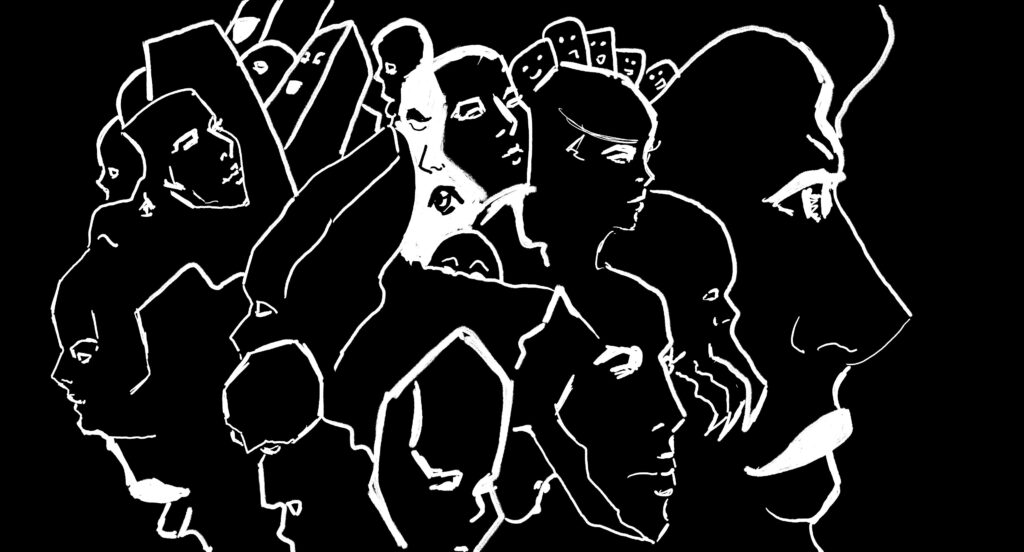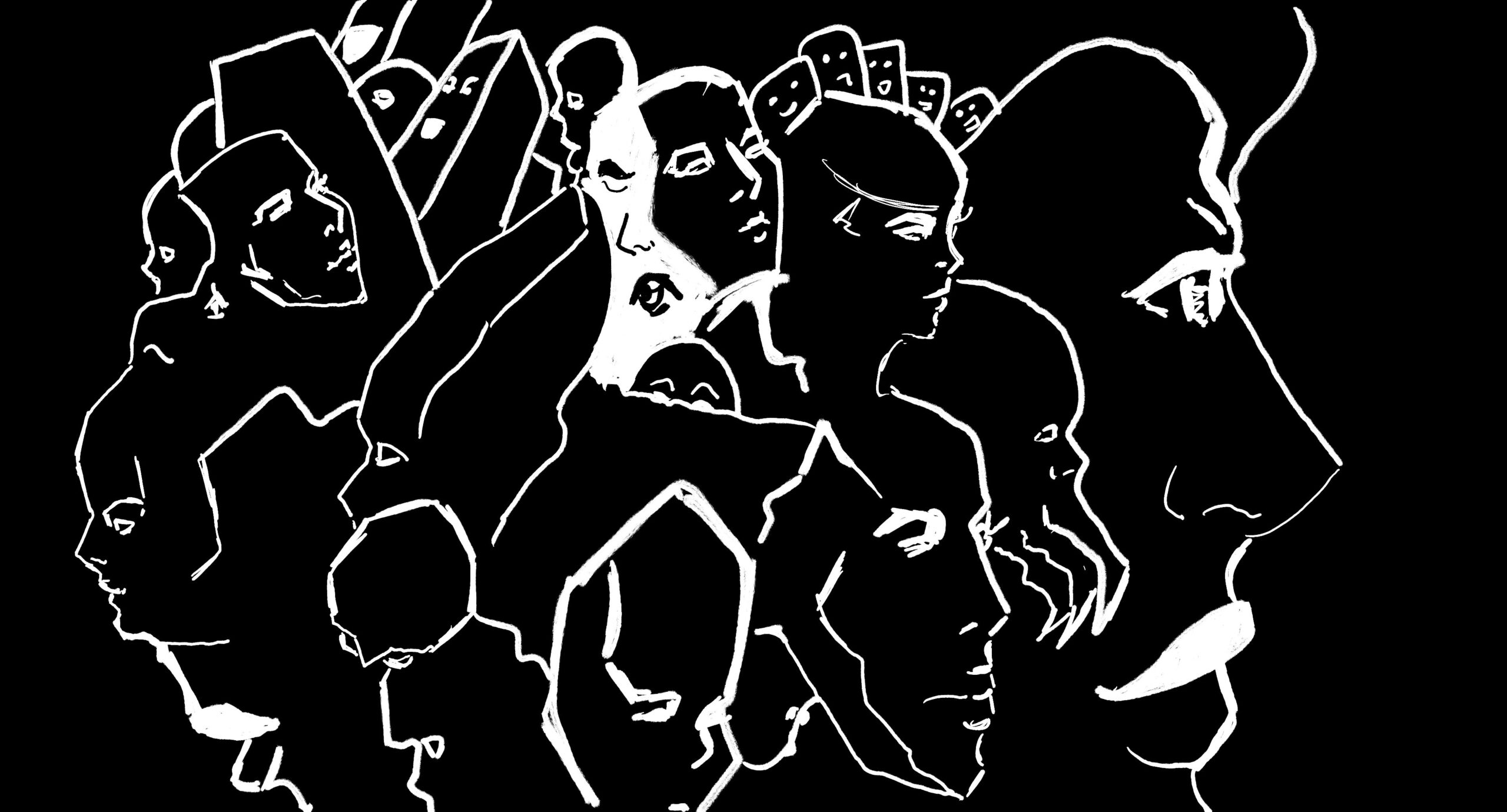
- How does Horror unfolds?
- Horror accumulates gradually in a closed Space.
- Independently of this Space’s scale.
- Horror saturates.
- And then Bursts.
Summary – 6 steps to Horror
- Establish a Changing Atmosphere.
- Create a Place of Comfort.
- Place a Precious Object in this Place.
- Place a Threat.
- Let Brutality & Pain accumulate.
- In order to prepare the Separation.
- You only need 2 elements to create Horror:
- Offer something precious.
- Remove it.
- It also works for Drama & Comedy.
Polymorph Atmosphere
Horror’s Atmosphere has 3 Dimensions : the Stagnation, the Depths & the Unknown.
- Stagnant Atmosphere
- The Characters must have the sensation they are visiting a Dead World.
- A World which cannot Change anymore.
- Which cannot Evolve.
- Where Life cannot be Renewed.
- All should Stagnate:
- Light
- Sound
- Temperature
- They shouldn’t feel that this World is Inert.
- Inertia has a reassuring dimension.
- There’s no threat in Inertia.
- A Stagnant World, was once alive.
- And wishes to recover its lost life.
- By taking it from the Characters.
- Deep Atmosphere
- Horror bears Attractiveness.
- Use limited Light.
- Place light Deliberately.
- In order to Limit Information.
- And to Focus the Characters Attention.
- A deep space feels Cryptic.
- Information is scarce in the depths.
- This scarcity creates Attraction to this Deeper Space.
- The Depths generate themselves.
- There’s a sense of Aesthetic in these moving shades.
- Captivating forms, partially seen catch the eyes.
- These Sable animations call your Characters.
- Alien Atmosphere
- Horror is always set up.
- Start your Story with Familiar, reassuring elements.
- And then, let the Mundane be Consumed.
- Absorbed by Otherworldly elements.
- Everything will become a potential source of Dephasing.
- To create Confusion.
- To break Expectations.
- A Peculiar World in which the Characters fantasies can Develop.
- An Alien world begets Unrelenting odd.
- It is a New World.
- Bearing New Possibility.
- Invading the Characters Minds.
- Unlike in the Known world, there are no Consequences here.
If you want to know more about Atmospheres.
Comfort & Protection
- Comfortable Area
- Your Characters need to rest.
- They need a place in which they can feel safe.
- A Little Space.
- A Cramped Space.
- With Limited Comfort.
- It should only respond to their Basic needs.
- A small room may feel pressuring.
- But remember…
- In a small Room, it’s easier to see a menace coming.
- Precarious Protection
- This room is Fragile.
- Is is only more Secure than the rest of the Environment.
- It doesn’t mean that it should be Solid.
- Its reliability is Limited.
- The Main Protection this place offers is Discretion.
- Your Character are meant to Hide in this room.
- If this place is discovered, it will be destroyed.
- This room is Delicate.
- Slightly Shambling.
- And Dear to the Characters.
- They have to Protect this Room as much as it Protects them.
- Precious object
- Who hides in this Room?
- The Characters.
- And all the Characters want to protect.
- A Fragile Creature.
- A Juvenile Creature.
- A Child or an Animal.
- A Creature Unlikely to protect herself.
- The Object the Characters wish to Protect may be an Immaterial object.
- It can be the Room itself.
If you want to know more about Familiarity.
Pain & Brutality
- Threat
- Once you’ve established the Atmosphere & the Space of Comfort…
- Introduce the Threat.
- A Restless threat.
- Which only exists for the Characters.
- She is there to find them.
- The Threat is bonded to the Characters.
- Whichever its objective may be.
- Duress
- Horror is Frustration.
- The Threat must pressure the Characters.
- She must force them to Act.
- She should exhaust them.
- It may not only be a matter of Physical Integrity.
- The Threat may not want to Hurt the Characters.
- Yet, she will.
- Make use of the Environment.
- Let the Environment enclose the Characters.
- Trap them.
- Violence
- The Characters & the Threat will react to each other’s presence.
- They will react Intensely.
- In the late stages of the Story, the Characters will be exhausted.
- They will seek the Threat.
- They will pummel her.
- Every deep horror story allows the Character to become the new Threat.
- Only for the sake of Retaliation.
- In this kind of Story you want to display the Pettiness of a Character who fancies herself Absolute.
If you want to know more about Pain.
Separation
- Loss
- Loss does not have to be Definitive.
- Loss can be Transitory.
- Loss can be prepared through the Environment.
- By placing Icons & Symbols.
- By telling Tales.
- The use of Allegory give a sense of Eternity to Loss.
- Persisting Grief
- If a Character dies early in the Story.
- Be sure to Display the Consequences of this Death.
- Loss & Grief only exist in their Consequences.
- Let the pain persist.
- Let it be reminded :
- By the Threat.
- By the responsible of the Character’s death.
- By the Environment.
- Every element is a Tool to bring back the Pain.
- Place of Separation
- Separations happen in Memorable Places.
- Design a space in which the Characters will be separated.
- Use Symbols to reinforce the Specificity of the Place :
- Objects
- Scriptures
- Create an Attachment to a Specific Character :
- Victim
- Main Character
- Perpetrator
- Use Specific Lighting.
- Highlight the Separation.
- Use Colors contrast to distanciate the Character from the Object of its want.
- Use Sounds to open the scar further.
- A Song.
- Or a Scream.
